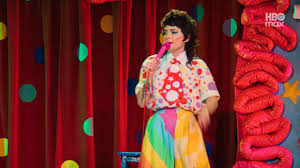Soul 2024 Movie Review
Where do people get their personalities? Do parents play a part, or are such things somehow determined before birth? For centuries, doctors of psychology, doctors of philosophy and doctors of theology have contributed their thoughts on the subject, but the latest breakthrough comes from another kind of doctor entirely: Pete Docter, the big-idea Pixar brain behind outside-the-box toons “Inside Out” and “Up,” who takes a look deep inside and comes up with another intuitive, easy-to-embrace metaphor for — dare I say it — the meaning of life.
The result is “Soul,” a whimsical, musical and boldly metaphysical dramedy about what makes each and everybody tick, featuring a cast of characters who don’t have bodies at all. “Soul” opens with the death of its down-on-his-luck hero, middle school band teacher Joe Gardner (Jamie Foxx), a frustrated pianist who aces a jazz band audition, then steps out into the street, where he narrowly avoids being smushed by construction workers and crushed by an oncoming car, only to fall through a manhole to his untimely end.
This is not at all where one expects a kids movie to begin. Not even “Bambi” went so far as to kill its main character before the opening credits. But then, “Soul” plays hardly anything by the rules. Frankly, this may not be a kids movie at all, although releasing directly to Disney Plus subscription service on Dec. 25 (amid COVID-19’s second wave) suggests the studio is treating it as such. Joe’s death isn’t scary, but it asks young audiences to acknowledge the issue of mortality in a way that few films dare. And then, it proceeds to bend — although “shape” might be a more accurate word — their understanding of what happens before and after people’s lives on Earth.
Just before he bites the dust, Joe lands his big break, earning a shot to play with jazz legend Dorothea Williams (Angela Bassett) at the Half Note club. Nearly all his life, Joe has wanted nothing more than to be a musician. He’s good, too, given the improvisations we’re privy to here — in class, in rehearsal and later, in the solitude of his own apartment. So it’s not surprising that he might be alarmed to find himself on a conveyor belt through the Great Beyond, the void-like zone Docter and production designer Steve Pilcher have imagined late souls enter just before they are zapped into oblivion.
Again, this sequence could have been intimidating for young viewers — or old ones, for that matter — though the movie treats it lightly, allowing Joe (who’s the only soul with second thoughts about the afterlife) to fall off the escalator and plunge through several dimensions to the Great Before, a more Elysian Fields-ian place with lilac skies and periwinkle grass where giggly, vaguely Casper the Friendly Ghost-like souls are prepped for Earth.
It’s an awe-inspiring answer to an impossible challenge: How to animate the not-yet-animate? But this is a Pixar movie, so it’s no surprise that the team opts to cutesify the abstract idea of a pre-corporeal self, giving each soul googly eyes and a pure glow. What we see are adorable amorphous blobs with trippy chromatic aberration around the edges — color fringing that suggests the virtual lenses can barely capture their elusive luminosity (and the opposite of old-school animation, where characters were “contained” by thick black lines).
There are rules for this realm, which recall the ingenious way Docter translated the notion of human emotion into clean cartoon terms with “Inside Out.” Nascent souls appear here and are guided along by mentors — those who have already lived and seem keen to pass their passions along to the next generation. Once new souls discover their “spark,” they’re given an entry pass to Earth, where they’re presumably assigned to an infant body. (It’s a far more sophisticated explanation of where babies come from than the delivery storks of “Dumbo” — or Pixar’s own “Partly Cloudy” short.)
That’s where Docter’s groundbreaking theory of where people get their personalities factors in: Some components are imprinted at the “You Seminar” (another, more corporate-sounding name for the Great Before), and others are discovered with a little helpful guidance from the older souls. The model isn’t perfect, but there’s a certain brilliance in encouraging kids to identify what excites them in life. One can imagine “Soul” leading to early “eureka” moments in some viewers. Still, the film seems better suited to adult audiences, the way Capra’s “It’s a Wonderful Life” or Dickens’ “A Christmas Carol” resonates differently with a little life experience.
Joe wants to get back to the body that (we learn) is still hooked up to life support. But he’s mistaken for a mentor and randomly assigned to a “soul mate,” No. 22 (Tina Fey), a misfit who’s been around for ages and who seems perfectly content never to “get a life.” In fact, 22 prefers it in the Great Before, where countless, more accomplished mentors than Joe — from Abraham Lincoln to Mother Theresa — have tried (and failed) to find her spark. But the overseers — a trio of classic UPA-style line drawings (Alice Braga, Richard Ayoade and Wes Studi), each named Jerry — are easygoing enough to let these two give it a go, and before long, they find a loophole that lands them both on earth.
It’s going to be hard for “Soul” audiences to keep this next twist a secret, but for the sake of the review, let it be a surprise how the pair manifest on earth. Joe’s desperate to get back to that jazz club, while 22 would give anything not to be dragged along on his single-minded — and clearly selfish — mission to make his jazz dreams come true. (She far prefers her comfortable nonexistence to the assault of overwhelming noises and smells of New York City.) But now that she is alive, 22 starts to realize that it’s not as bad as she imagined.
That’s not a message kids need to hear, though there is surely no shortage of adults out there who wish they’d “never been born at all,” and “Soul” has the generous, big-hearted quality of so many Pixar movies before it that makes even a mediocre life seem like something to be appreciated. Docter and co-writers Mike Jones and Kemp Powers (the latter also co-directed) have filled the back half of the film with scenes that uplift and set receptive souls a-tingling.
First, there’s the barbershop, where Joe comes to realize that his obsession with music has interfered with his ability to make meaningful friendships. There’s the face-to-face with tough-love mom Libba (Phylicia Rashad) that puts some of his parental issues in perspective. And there’s the truly magical moment when Joe sits down at his piano and just starts playing, drifting off into what the movie refers to as “The Zone.” As the sage and slightly kooky-sounding British talkshow host Graham Norton puts it, in character as a mystic named Moonwind, “When joy becomes an obsession, one becomes disconnected from life.”
Of all the movie’s gambles — those big risks that might have caused this dazzling house of cards to collapse upon itself — the most unexpected is Pixar vet Docter telling fellow adults that there’s such a thing as being too focused on one’s dreams. Here’s a lesson coming from a studio where artists notoriously sacrifice their private lives to fulfill their passions, where long hours and absolute focus are expected of their employees. And then Docter goes and pushes his luck one step further with a life lesson hardly any family movie dares acknowledge: Sometimes, achieving your dream can leave you feeling emptier than you did before.
Like it or not, that’s a truth worth telling — a sincere, dark-night-of-the-“Soul” revelation —and one that feels far more radical than the long-overdue decision to center this film on a predominantly Black cast. Pixar’s been way behind the diversity curve for far too long: From its inception, the company has been a boys club in which the core team of (bright) white guys have taken turns directing movies about white characters: white toys, white fish, white cars, white ideas. They’ve made room to mentor, but have been slow to diversify their characters and stories onscreen.
And now this. It will be up to audiences of color to decide whether this exceptional film satisfies Pixar’s long void of near total nonrepresentation. “Coco” was a start, though this feels like a breakthrough: a cartoon where the hero could be any race, and his creators opted to project their imaginations beyond the mirror. And though it’s almost impossible to reverse-engineer who did what in a co-directing situation, one has to imagine that some of the film’s cultural perspective owes to co-director Powers (whose play, “One Night in Miami,” also reaches screen this fall). Judging by Mr. Mittens, the movie’s feline sidekick, the crew was light on cat lovers.
In any case, the unsung hero here — the heart of “Soul,” if you will — can be found in the music. From Betty Boop to the Pink Panther, jazz has shaped and inspired the medium of animation (especially in its more avant garde experiments). Pixar rekindles that connection, enlisting Jon Batiste to create the jazz portion of the score — from the fleet-fingered, Keith Jarrett-like improvisations Joe performs to the vibe of city life itself — while Trent Reznor and Atticus Ross delivered the New Agey sound of the before- and after-life.
It all blends together beautifully, a marriage of Pixar’s square, safe, feel-good sensibility with what could be described as the “real world” — and one that, much as “Inside Out” anthropomorphized the mind, will leave audiences young and old imagining their own souls as glowing idiosyncratic cartoon characters. And that’s just what the Docter ordered.




